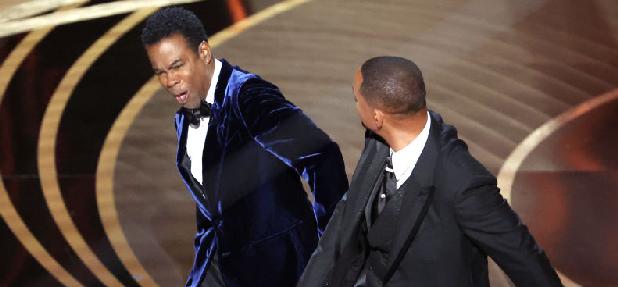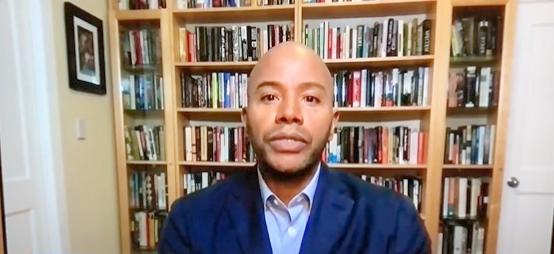
*(CNN) — My first thought after witnessing the iconic movie star Will Smith walk on the stage and slap comic legend Chris Rock at the Oscars on Sunday night was that this was some kind of planned stunt — the kind of “SNL”-inspired skit designed to juice up a show whose lag in cultural relevancy has been much discussed.
The slap heard ’round the world turned out not to be a skit, but an unplanned eruption whose cultural significance is now being refracted through the distorted lens of our disunited nation.
Smith ostensibly struck the comedian in defense of his wife, Jada Pinkett Smith, after Rock joked about her shaved head (a result of alopecia, a disease that Pinkett Smith has openly discussed). The “GI Jane” reference to a 1997 Demi Moore film in which she shaved her head while training for the Navy SEALs was pure Generation X, one that I am certain flew over the heads of most millennials and any younger viewers watching. But not Smith’s.
Will Smith should offer a full apology to Chris Rock, both publicly and in private. (Note: After this op-ed was published, Smith did issue a public apology, calling his behavior “inexcusable.”) As a Black man who believes that both racism and patriarchy have had negative effects on the Black community, I don’t believe in resorting to violence in the face of insults. However, none of us are the worst thing we have ever done. Smith’s actions do not negate all the good he has contributed as an actor, artist and humanitarian.
MORE NEWS ON EURWEB: Jim Jones Shows Off His ‘Weavahman’ Talents As He Does the Forecast for FOX 5 | WATCH
Nor does the wrongness of Smith’s behavior make Rock’s joke the right thing to have said at the Oscars.
Jada Pinkett Smith is a star and cultural titan in her own right. Through her “Red Table Talk” show, which has become an intergenerational phenomenon featuring her daughter Willow and mother Adrienne Banfield-Norris, she represents a passionate advocate of allowing Black people and communities to speak, experience and live their own truth even when that goes against the grain of accepted discourse.
Smith’s actions will be, and have been already, interpreted in multiple ways. Social media commentators and fellow comedians have deplored Smith’s attack as an invitation to direct violence against comedians who make offensive jokes. Others have defended Smith for seeking to defend his wife, noting that Black women are rarely protected in public.
This is a sentiment perhaps made all the more powerful in the wake of the recent Senate confirmation hearing for Judge Ketanji Brown Jackson, which underscored the extent to which Black women can come under unnecessarily harsh and punitive criticism.
Others have criticized Hollywood celebrities for literally embracing Smith (Denzel Washington was seen trying to calm him down, Bradley Cooper and Nicole Kidman hugged him and comforted Jada Pinkett Smith) after the slap and applauding him when he made history as only the fifth Black man to ever receive the Best Actor award, for his performance as Richard Williams in the film “King Richard.”
Some called for Smith, a high-profile Black actor, to be arrested and jailed (it’s worth noting that according to the Los Angeles Police Department, Rock declined to file a report), or to face sanctions from the Academy. None of this should be surprising, considering punishment, especially against Black folk who fail to color in between the lines, is a national pastime. One minute you are a cultural hero, the next someone is calling you a criminal.
Rock de-escalated the situation by not responding in kind on stage, and Smith’s acceptance speech minutes later reflected the complexities of the moment and its aftermath.
Visibly shaken by earlier events, a tearful Smith acknowledged Venus and Serena Williams and the entire Williams family for providing him a chance to play their father. He thanked God and described wanting to be a “vessel of love” through his work, a description suffused with new layers of ironic meaning given his earlier assault on Rock. At one point, he apologized to the Academy and those in attendance (although not to Rock) and ended by wondering if he would ever be invited back to this event.
It was truly an extraordinarily surreal set of moments to watch. Violence should have no place in American society. Yet when it does rear its ugly head, we should contextualize why it happened. Instead of advocating vengeance, we should seek restorative justice that focuses on healing, forgiveness and redemption — not punishment. Smith could have taken a step down that path by apologizing directly to Rock during his acceptance speech.
Neither Will Smith nor Chris Rock deserve to be canceled for their behavior on Sunday. Rock is a professional provocateur. As a young man, I remember watching Rock’s stand-up and being both inspired and disappointed at his no-holds-barred comments on racism, Black folkways, the N word, romantic relationships and much more.
Comedians, at their best, make us laugh and think — and they often anger us in the process. Chris Rock has always done that. From playing a drug addict in the 1991 Gen X urban classic “New Jack City” to maturing as a wealthy star who counts Jerry Seinfeld as one of his best friends, Rock has been a generational touchstone for both Black and multiracial audiences.
Will Smith is an icon whose seamless transition from 1990s rapper to sitcom star “The Fresh Prince of Bel Air” to full-on Hollywood leading man has made him perhaps the biggest crossover star of Generation X. One could easily argue that Smith’s chameleon-like ability to present himself as palatable to both Black and White audiences helped pave the way — culturally speaking — for the rise of the nation’s first Black president.
I understand the sentiment expressed by some that Smith’s actions ruined what should have been a historic moment, not just for himself but winners such as Ariana DeBose, whose supporting Oscar victory marked the first for an openly queer Latina actor, Ahmir “Questlove” Thompson whose nod for “Summer of Soul” as best documentary was a first by a rapper, and Troy Kotsur, the first deaf male actor to win a supporting Oscar for “CODA.”
I disagree — Smith derailed the ceremony, which is unfortunate, but the importance of these groundbreaking moments was not diminished. These milestones from the 2022 Oscars will stand and resonate in their own right.
But the ceremony and its dramatic turns have also broadly telescoped the political divisions within America that have become part of a new cultural war. The way we interpret Smith’s actions tells us a lot about what side of these partisan divisions we are on.
In a sense, Will Smith and Chris Rock find themselves, in front of a global audience, enacting dual sides of American exceptionalism. Chris Rock, backed by freedom of expression, can lob rhetorical jabs against Jada Pinkett Smith and claim protection by saying he was joking. In that instance, for Will and Jada Smith, it was no joke, but a kind of bullying that marginalized groups — particularly Black women — have all experienced at some moment. It does not excuse Smith’s subsequent actions, but contextualizes them.
We are left then with Smith, who behaved in perhaps the most quintessentially American way ever witnessed on an Oscar broadcast. After slapping Chris Rock, he returned to his seat, attended to by high-powered friends like Denzel Washington and Tyler Perry. When he won the highest honor of his profession, his words in response were a tour de force of contrition without actually seeking forgiveness from the person he had most wronged.
His speech, which laid out his self-image as a “protector,” revealed his disruption of the ceremony to be as much about himself — as a father, husband and patriarch — as it was about defending his wife.
In some respects, Will Smith embodied the best and worst aspects of the American Dream on Sunday night: the world honored his greatness as an artist even as his supposed need to be the man of his house compromised that greatness.
Over the course of his career, Will Smith has been an expert storyteller, crafting a narrative of bootstrap ascent and multiracial bonhomie that has made him an icon who, until Sunday night’s events, seemed to transcend race.This is no longer the case — as he now is being pilloried and praised for displaying the kind of behavior that risks reinforcing stereotypes of Black male rage (the kind former President Barack Obama made sure to never display, even when being publicly attacked).
At a deeper level, the contradictions of Will Smith’s words and actions Sunday night revealed, for all the world to see, the flawed humanity of an entertainment industry often criticized for being out of touch or preaching wokeness from the lofty heights of entrenched celebrity and wealth. Celebrities, it seems, face the same pitfalls as the rest of us.

Editor’s note: Peniel E. Joseph is the Barbara Jordan Chair in ethics and political values and the founding director of the Center for the Study of Race and Democracy at the LBJ School of Public Affairs at the University of Texas at Austin, where he is also a professor of history. He is the author of the forthcoming book, “The Third Reconstruction: America’s Struggle for Racial Justice in the Twenty-First Century,” in addition to “Stokely: A Life” and “The Sword and the Shield: The Revolutionary Lives of Malcolm X and Martin Luther King Jr.” The views expressed here are his own. View more opinion articles on CNN.
The-CNN-Wire
™ & © 2022 Cable News Network, Inc., a WarnerMedia Company. All rights reserved.
We Publish News 24/7. Don’t Miss A Story. Click HERE to SUBSCRIBE to Our Newsletter Now!





